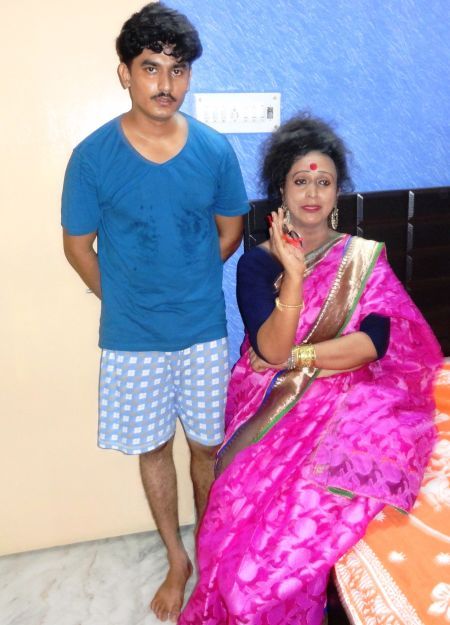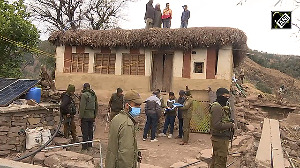
Manobi Bandyopadhyay, India's first transgender principal of a college, speaks of her struggles in a moving interview.
There was a time when the owner of a car would wash the seats after she travelled by it; landlords refused to have her as a tenant; her closest kin made fun of her 'strangeness.'
Not any more.
Today, the media makes a beeline to Manobi Bandyopadhyay's South Kolkata apartment to interview her.
On June 9, Bandyopadhyay, 50, will be the first transgender in India, if not in the world, to take charge of a college -- the Krishnanagar Women's College of Bengal -- as principal.
She is currently an Associate Professor in Bengali at the Vivekananda Satobarshiki Mahavidyalaya in West Midnapore district.
Ever since Bandyopadhyay underwent sex reassignment surgery in 2003 and changed her name from Somnath to Manobi, it has been a long, arduous and mostly lonely trip for her, a journey fraught with struggle, pain and tears.
In an interview with Indrani Roy/Rediff.com, Bandyopdhyay, decked up in a resplendent sari and her curly hair done up in a carefully-careless bun, described the pangs of her sexuality, social stigma, her occasional defenselessness and most importantly, her fortitude.
When did you first feel that there was a woman inside you?
I recognised the woman in me from an early age. I played football like any other kid, climbed trees and went fishing.
While I was doing all these, I did realise that there was a woman in my soul.
Did you confide in anyone?
Not really. The whole thing was pretty confusing. I decided to educate myself instead. My effeminate traits were obvious though.
What was your parents's reaction?
There was a huge cultural gap between my parents. My father's family were bangals (migrants from then East Pakistan, now Bangladesh) while my mother's were ghoti s (natives of West Bengal). Ma was very keen on educating me and my sisters.
In spite of being an overworked housewife in a joint family, she squeezed out time from her busy schedule to read us story books and teach us Rabindra Sangeet. I owe my education, my sense of reasoning to Ma.
She loved me a lot. And at times she got caught between her affection for me and society's hatred for my sexual orientation.
Baba, on the other hand, openly disapproved of my sexual orientation and there was stiff resistance. I don't hold any grudge against my parents. Their reactions were natural. I was their most loved youngest son. My orientation was bound to make them unhappy. (Pauses.)
However, things changed over the years. Age, as you know, does strange things to your mind. Baba, now 92, takes a lot of pride in me, his 'youngest daughter' (smiles).
Now if anyone asks him, 'apnar chhele to meye hoe giyechhe, tai na (Your son underwent sex change surgery, right)', pat comes the reply, 'Se to bohu bocchor aager byapar. Apni atodine janlen? (That happened years back. It's strange that you came to know of it now).'
Two of my elder sisters are very supportive. They have always been like that. Now that I am being hounded by the media, Didi, who stays close by, cooks dinner and sends it over. We share a very close bond.
Did your parents take you to psychiatrists? How did they treat you?
Yes, they did. I had to spend a lot of time with counsellors. Strangely, these counsellors, instead of empathising with me, started telling me what my parents wanted me to be. They 'taught' me how I ought to 'oppose' the woman in me. They tried to make me believe that I was after all a man and ought to behave like one. They gave me sleeping pills and thought my confusion about my orientation would pass soon.
It must have been really painful for you...
It was. I could never make any one understand what I wanted. I could read disapproval in the eyes of people around me. My heart ached all the time.
I wrote a book Endless Bondage on the sufferings of eunuchs and third gender. The book was an outcome of my own experience.
Were you angry at society for being nasty towards you?
I was angry, mad and also helpless at times. I knew I was not at fault, yet I was being victimised. Why is everybody so cruel, I asked myself. Where can I find some peace?
Having overcome the hardships, now I feel we, people who constitute society, are also to blame. Society has some set notions and we just blindly follow them.
Why is it always thought that women are 'delicate darlings' and they need men around them to feel secure? Why would married women be besotted about their husbands? Women should be happy, independent and confident.
Society, even today, refuses to respect women and we, women, just accept it hands down.
How did you keep calm in those difficult days?
I think it was my education that helped me to a large extent.
I did my master's in Bengali from Jadavpur University, an MPhil on Bengali writer Ashapurna Devi and a PhD on the third gender from Kalyani University.
As an undergraduate, I also studied economics and political science. This interesting combination of subjects perhaps helped me being logical and cool even in such deep crisis.
Also, my faith in Ramkrishna Paramhansa, Sarada Devi and Swami Vivekananda aided me a lot. I am a follower of Swami Atmasthananda Maharaj of Belur Math. His teachings were my source of strength.
In those dark hours, I read Sri Sri Ramkrishna Kathamrita, a compilation of Ramkrishna's words.
It was at this time that I started delving into my mind... Why was there a conflict between Marxism and religion? Why did Marxism propagate that 'Religion is the opium of the people'? Why was Marx so critical of society?
These questions haunted me, all the more so when I saw some staunch believers in Marxism were bent on making my life miserable. Who are these people, I asked myself. Why were they acting like my sworn enemies? If they believed in Marxism, why didn't they believe in equality? Why were they after my life?
Why do you think this society of ours is still so cruel towards the third gender?
I think society is not only cruel to the third gender. It's generally cruel to women. Society just shudders at the very thought of effeminacy.
This hatred towards transgenders arises from Indian society's overall contempt towards women in general. It is really sad.
After you decided to go for a sex reassignment operation, were there aftershocks?
In 2003, I decided to opt for Rs 500,000 sex change operation. I was teaching in a college in Jhargram then. It was a very difficult decision. But it was absolutely necessary.
Talking of aftershocks, there was a deluge of opposition. The Left Front was at the helm in Bengal. There was a conspiracy to have me sacked. I was denied my salary for some time. I filed a suit against these conspirators and won. I was fighting many battles at that time.
I was dealing with my sexuality as well as countering social and financial attacks hurled at me by some really 'well meaning' moral police (smiles).
If I travelled by a car, the owner would wash the seats thoroughly after I got down. No landlord wanted to rent a house to me. It was horrible. There was darkness all around. I was on the verge of committing suicide. Ultimately, my faith in God pulled me out of despair.
What was your motivation?
(Sings) Amar hiyar majhe lukiye chhile/Dekhte ami payni tomaye (Thee were hidden in my heart/So I couldn't find thou art)...
I drew inspiration from my thakur (God) and thakur (Rabindranath Tagore). Tagore's songs were a constant source of encouragement. I must also mention that around this time, I fell in love.
It was my lover who had talked me into going for this operation so that we could get married. Besides, I was so much like the fairer sex, transforming into a woman was an unavoidable destination for me.
The marriage had an unhappy ending, right?
Oh yes! It was bitter. My ex-husband succumbed to social pressures.
I had revealed his name and photograph during an interview to the media, he filed a defamation suit and even dragged me to the Supreme Court. I fought a lengthy legal battle and won. It reconfirmed my faith in India's judiciary.
Now when I look back, I think the offer for marriage was nothing but a trap laid out by a man who wanted to malign me and wanted to strip me of my identity.
Perhaps, my ex-husband thought lawsuits and my eventual arrest would put an end to my bright career.
Do you intend to marry again?
No. I will rather have a pet dog. I think dogs are more faithful than most men (smiles). I don't want to repeat my mistake. I have no qualms in admitting that I have had relationships, but marriage did not take place.
Why so?
To be honest, I can't trust men. And I can't allow myself to be cheated again.
What is your opinion of homosexuals?
I think homosexuals have easier lives than us, the transgenders. If two men or two women want to take a room on rent, they won't face any problem.
Unless the homosexuals declare their state, society most often fails to know their orientation. But transgenders are not that lucky. We are subjected to ridicule and abhorrence right from day one.
Were you in touch with filmmaker Rituparno Ghosh?
Yes. Ritu did undergo sex reassignment surgery, though he chose not to declare it. I think he was inspired by my case. He was such a talented soul. We often exchanged SMSese and were in touch. His death was a shocker. I still miss him. I wish I had spent more time with Ritu.
Tell us about your adopted son Debasish Manobiputro...
I met him in 2011 during a seminar. He hails from a remote village. The moment I saw him, I felt like caring for him. I wanted to mother him and take care of him. His biological parents are really nice and they did not object to his staying at my place.
Deba brought a breath of fresh air into my world. When he took me to his native place, I was overwhelmed by his family's hospitality.
After Deba shifted into my house, he gave up his birth name and rechristened himself Debasish Manobiputro.
Will you be happy if Debasish marries a transgender?
No. I don't think he will be able to adjust. Also, as a mother, I don't want him to suffer like me.
What do you feel about the Supreme Court recognising transgenders as the 'third gender'?
It was stupendous. It was a victory for us. India is a fascinating country.
O amar desher mati/Tomar pore thyakai matha (O my native land, I bow my head to you in deep obeisance).
We hear teachers at the Krishnanagar Women's College are overjoyed to have you as their principal...
They are. It is a great feeling. Just as a mountaineer forgets the pain of climbing once s/he reaches the summit, so also, my success will gradually erase my pain.
There is someone however -- a principal of a reputed college -- who ridiculed my new status and said, 'Do you think you are fit to be principal?'
But then life has taught me to ignore such nonsense (laughs).
Having fought with society real hard, would you like to send out a message to the third gender?
First, I have a message for the general population: Be kind to one and all. The onus rests on the common people to be considerate to people who are out of the ordinary and different.
As for the transgenders, especially my friend Jyoti Samanta, who stays with us now, I want to tell them, chase excellence and be successful. Then, the very society that hated you will be in awe of you.
Would you like to be associated with non-government organisations that are working for the cause of the third gender?
Not really. Though I know it was the NGOs's relentless struggle that paved the path for the Supreme Court's recent ruling, I think the NGOs that work with transgenders don't want them to be a part of the mainstream. NGOs need transgenders to be a class apart for their own sustenance.
I don't want to offend any one here. But this is exactly how I feel.
Social networking sites are showering praises on you. What has been the best compliment so far?
There is a colleague of mine whose husband has deserted her. There used to be all sorts of dirty rumours about her. Though we were not in touch, her grim face used to haunt me. Once when I tried to speak to her, she avoided me. I thought she, like many others, hated me.
One night, I got some rather emotional text messages on my mobile from a certain number. I called up to find out who it was. It was a female voice on the other end, it was whimpering. After much persuasion, the voice revealed its identity. It was her.
'Why are you crying, my dear,' I asked.
'Manobidi, life is so complicated. I don't know how to cope,' she said.
'But I am learning from you. You are my inspiration,' she said in a muffled voice.
Her words made me cry. I couldn't have asked for better recognition.
Image: Manobi Bandyopadhyay with her adopted son. Photograph: Indrani Roy/Rediff.com











 © 2025
© 2025